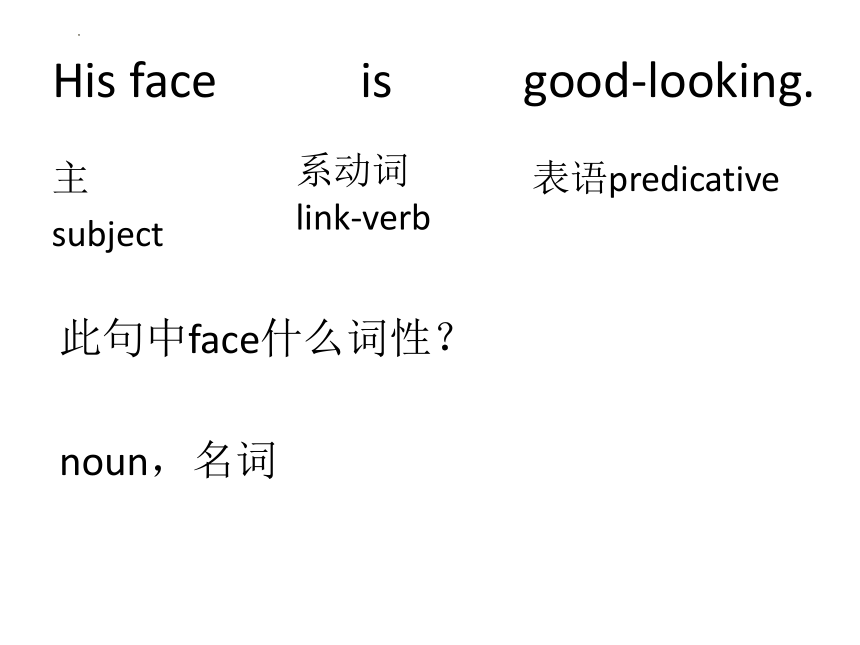2024届高三英语二轮复习掌握句子成分与解析课件-(共15张PPT)
文档属性
| 名称 | 2024届高三英语二轮复习掌握句子成分与解析课件-(共15张PPT) |

|
|
| 格式 | pptx | ||
| 文件大小 | 87.0KB | ||
| 资源类型 | 教案 | ||
| 版本资源 | 通用版 | ||
| 科目 | 英语 | ||
| 更新时间 | 2024-04-27 00:00:00 | ||
图片预览







文档简介
(共15张PPT)
掌握句子成分与解析
句子成分与词汇词性
单词多词性,如何判断和应用?
For example
face / fe s /
n.脸,面部;面部表情,脸色;人;初看,初听;尊严,威信;面貌;(物体的)正面,表面;斜坡,山坡;钟面,表盘;采掘面,工作面;(球拍的)拍面;(尤指足球的)球门
v.面临,遭遇;正视,面对;与……交往,与……交谈;面向,面朝;迎战,对阵;抹盖,覆盖;接受,容忍
What’s the meaning of the word “face”
His face is good-looking.
主
subject
系动词link-verb
表语predicative
此句中face什么词性?
noun,名词
The garden faces south.
主语subject
谓语predicate
状语adverbial
You will face your future.
Subject主语
Predicate
谓语
Object
宾语
这两个句子中的face是什么词性?
Verb,动词
You will face a fact that your face has been old.
同一单词以不同词性出现在同一句子中。
you 主语subject;
will face 谓语predicate
a fact 宾语object
that your face has been old同位语从句
Your face has been old
主 系 表
1.1成分与词性
句子成分 意义 对应的实词
核 心 成 分 主语 动作的发出者 n.pron.num.
谓语 动作或状态 vi,vt
宾语 动作的承受者 n.pron.num.
表语 跟在系动词之后 n.pron.num.a. ad.
修 饰 成 分 定语 修饰名词 a.
状语 修饰动词,形容词,副词或句子 ad.
宾补 对宾语补充说明 n.a.ad.prep-phrases, v-ing,v-ed
同位语 对其它名词的说明 n.
词性(part of speech)
词汇按照其本身含义可以分为10大类:
动名形副数,代冠连介叹。
前六种属于实词;后四种属于虚词。
Some words can be considered more than one part of speech, depending on context and usage.
Interjections can form complete sentences on their own.
1.2句子成分解析实战
解析句子成分的三大步骤:
1.找出句子中的谓语动词,判断句子是主谓或主系结构(被动语态中的be动词要注意)
2.确定动作的发出者和承受者
3.根据句子含义标出其它成分
1.找出句子中的谓语动词
动词类型 意义 范例
实意动 词Action Verbs 表动作,分为不及物动词vi和及物动词vt 例词: do,have,run,take,drive----
run vi.跑步 vt.经营
例句:I run everyday.
I run a company.
连系动词 Linking Verbs 表状态,不表示动作,含义不完全,后面必须接形容词或名词等。如何判断是否为系动词?逻辑上可以接形容词的动词就可以视为系动词 例词:be,become, seem, prove,turn out----
例句:The ball is red.
The children are smart.
He becomes strong.
That sounds good.
They look awesome.
类型 意义 范例
助动词 auxiliary verbs, helper verbs or helping verbs, 无意义,通过自身的变形来表达时态,否定,强调,被动或主动,疑问等。Auxiliary verbs are a type of verb that takes a supportive role in a sentence, second to the main verb. They’re used mainly to create complex grammatical tenses,emphasis, voice,and mood etc. 例词:be, do, will and have
例句:
I am going to the zoo.
I did not want to go home.
You like the book, don’t you
I do like the book!
[action verb] I did my homework already.
[auxiliary verb] I did not want to go home.
[action verb] I have a selfie with Neil deGrasse Tyson.
[auxiliary verb] I have waited a long time for this.
类型 意义 范例
情态动词 Modal verbs You can use modal verbs to express different meanings of the main verb, such as showing possibility (“It might rain”), ability (“It can rain”), necessity (“It must rain”), or suggestion (“It should rain”). Moreover, the modal verb will is necessary to express all future tenses (“It will rain”). 含义不完全,需和实意动词action verbs一起构成谓语。 例词:can,may,must,will,have to,ought to, dare,etc.
例句:
I can do it.
主 谓 宾
Jorgen skates backwards.
Jorgen can skate backwards.
I may delete this later.
She may delete this later.
I have deleted this already.
She has deleted this already.
be,will,have, do后面接其它动词,则为助动词
六大基本句型
1.主语---谓语(不及物动词vi.)Love died.
2.主语---谓语---宾语(及物动词vt.)
I loved her.
3.主语---谓语---宾语---宾补
Love made us happy.
4.主语---谓语---间接宾语---直接宾语
Love gave us happiness.
5.主语---系动词---表语
Love was sad.
6.There be (存在句)
There was love between him and her.
总结:句子结构种类
1.主谓宾
(宾语,双宾语,宾宾补,都由谓语动词决定。)
2. 主系表
(a.,ad.不能做宾语,才衍生出了表语predicative)
掌握句子成分与解析
句子成分与词汇词性
单词多词性,如何判断和应用?
For example
face / fe s /
n.脸,面部;面部表情,脸色;人;初看,初听;尊严,威信;面貌;(物体的)正面,表面;斜坡,山坡;钟面,表盘;采掘面,工作面;(球拍的)拍面;(尤指足球的)球门
v.面临,遭遇;正视,面对;与……交往,与……交谈;面向,面朝;迎战,对阵;抹盖,覆盖;接受,容忍
What’s the meaning of the word “face”
His face is good-looking.
主
subject
系动词link-verb
表语predicative
此句中face什么词性?
noun,名词
The garden faces south.
主语subject
谓语predicate
状语adverbial
You will face your future.
Subject主语
Predicate
谓语
Object
宾语
这两个句子中的face是什么词性?
Verb,动词
You will face a fact that your face has been old.
同一单词以不同词性出现在同一句子中。
you 主语subject;
will face 谓语predicate
a fact 宾语object
that your face has been old同位语从句
Your face has been old
主 系 表
1.1成分与词性
句子成分 意义 对应的实词
核 心 成 分 主语 动作的发出者 n.pron.num.
谓语 动作或状态 vi,vt
宾语 动作的承受者 n.pron.num.
表语 跟在系动词之后 n.pron.num.a. ad.
修 饰 成 分 定语 修饰名词 a.
状语 修饰动词,形容词,副词或句子 ad.
宾补 对宾语补充说明 n.a.ad.prep-phrases, v-ing,v-ed
同位语 对其它名词的说明 n.
词性(part of speech)
词汇按照其本身含义可以分为10大类:
动名形副数,代冠连介叹。
前六种属于实词;后四种属于虚词。
Some words can be considered more than one part of speech, depending on context and usage.
Interjections can form complete sentences on their own.
1.2句子成分解析实战
解析句子成分的三大步骤:
1.找出句子中的谓语动词,判断句子是主谓或主系结构(被动语态中的be动词要注意)
2.确定动作的发出者和承受者
3.根据句子含义标出其它成分
1.找出句子中的谓语动词
动词类型 意义 范例
实意动 词Action Verbs 表动作,分为不及物动词vi和及物动词vt 例词: do,have,run,take,drive----
run vi.跑步 vt.经营
例句:I run everyday.
I run a company.
连系动词 Linking Verbs 表状态,不表示动作,含义不完全,后面必须接形容词或名词等。如何判断是否为系动词?逻辑上可以接形容词的动词就可以视为系动词 例词:be,become, seem, prove,turn out----
例句:The ball is red.
The children are smart.
He becomes strong.
That sounds good.
They look awesome.
类型 意义 范例
助动词 auxiliary verbs, helper verbs or helping verbs, 无意义,通过自身的变形来表达时态,否定,强调,被动或主动,疑问等。Auxiliary verbs are a type of verb that takes a supportive role in a sentence, second to the main verb. They’re used mainly to create complex grammatical tenses,emphasis, voice,and mood etc. 例词:be, do, will and have
例句:
I am going to the zoo.
I did not want to go home.
You like the book, don’t you
I do like the book!
[action verb] I did my homework already.
[auxiliary verb] I did not want to go home.
[action verb] I have a selfie with Neil deGrasse Tyson.
[auxiliary verb] I have waited a long time for this.
类型 意义 范例
情态动词 Modal verbs You can use modal verbs to express different meanings of the main verb, such as showing possibility (“It might rain”), ability (“It can rain”), necessity (“It must rain”), or suggestion (“It should rain”). Moreover, the modal verb will is necessary to express all future tenses (“It will rain”). 含义不完全,需和实意动词action verbs一起构成谓语。 例词:can,may,must,will,have to,ought to, dare,etc.
例句:
I can do it.
主 谓 宾
Jorgen skates backwards.
Jorgen can skate backwards.
I may delete this later.
She may delete this later.
I have deleted this already.
She has deleted this already.
be,will,have, do后面接其它动词,则为助动词
六大基本句型
1.主语---谓语(不及物动词vi.)Love died.
2.主语---谓语---宾语(及物动词vt.)
I loved her.
3.主语---谓语---宾语---宾补
Love made us happy.
4.主语---谓语---间接宾语---直接宾语
Love gave us happiness.
5.主语---系动词---表语
Love was sad.
6.There be (存在句)
There was love between him and her.
总结:句子结构种类
1.主谓宾
(宾语,双宾语,宾宾补,都由谓语动词决定。)
2. 主系表
(a.,ad.不能做宾语,才衍生出了表语predicative)
